Is it true that advances in mathematics and geometry shorten the path to professional programming? What about chemistry and physics?
Andrey Tereshko, head of the frontend Uchi.ru : The path to professional programming, first of all, shortens curiosity and interest in solving one's problems using programming.

On the left Andrei Tereshko is the head of the frontend, on the right is a 5th grade student
Andrei Rynkevich, product owner of MTS Big Data : There is a lot of abstract programming in programming. Any discipline that develops abstract thinking and formal logic will help in its study.
Oleg Duletskiy, lead backend developer of Ruby on Rails Uchi.ru : Mathematics and geometry are needed, rather, in order not to be afraid of problems that at first glance seem unsolvable.
Ivan Chernov, technical director of Ostrovok.ru: Physics helped me on the path of professional programming, because in high school I participated in olympiads on solving problems using numerical methods. Then all the abstractions of algorithms and data structures were superimposed on the real world, and it became clear why one should be able to efficiently calculate formulas if they suddenly do not have an analytical solution.
I see more successful programmers than I - former philologists and chefs. In this connection, now I think that STEM is a good base, but you also need to have a good outlook on it in related disciplines.
How important was the role of teachers in your studies? Did you have to be motivated, kicked, or did you have good self-organization?
Sergey Pimkov, Deputy General Director for Development and Operation of Selectel Products : As far as I remember, it was a very thankless task to motivate me. Only one technique worked - letting me construct my knowledge system on my own. It is very cool to observe how a whole system is built out of disparate facts and assumptions, which has predictive power and generally brings profit, and not by itself. If I didn't manage to do something like that in the lesson (for example, in English), for me it was an abyss of oppression and despair. In assessments, this attitude was also converted so-so.
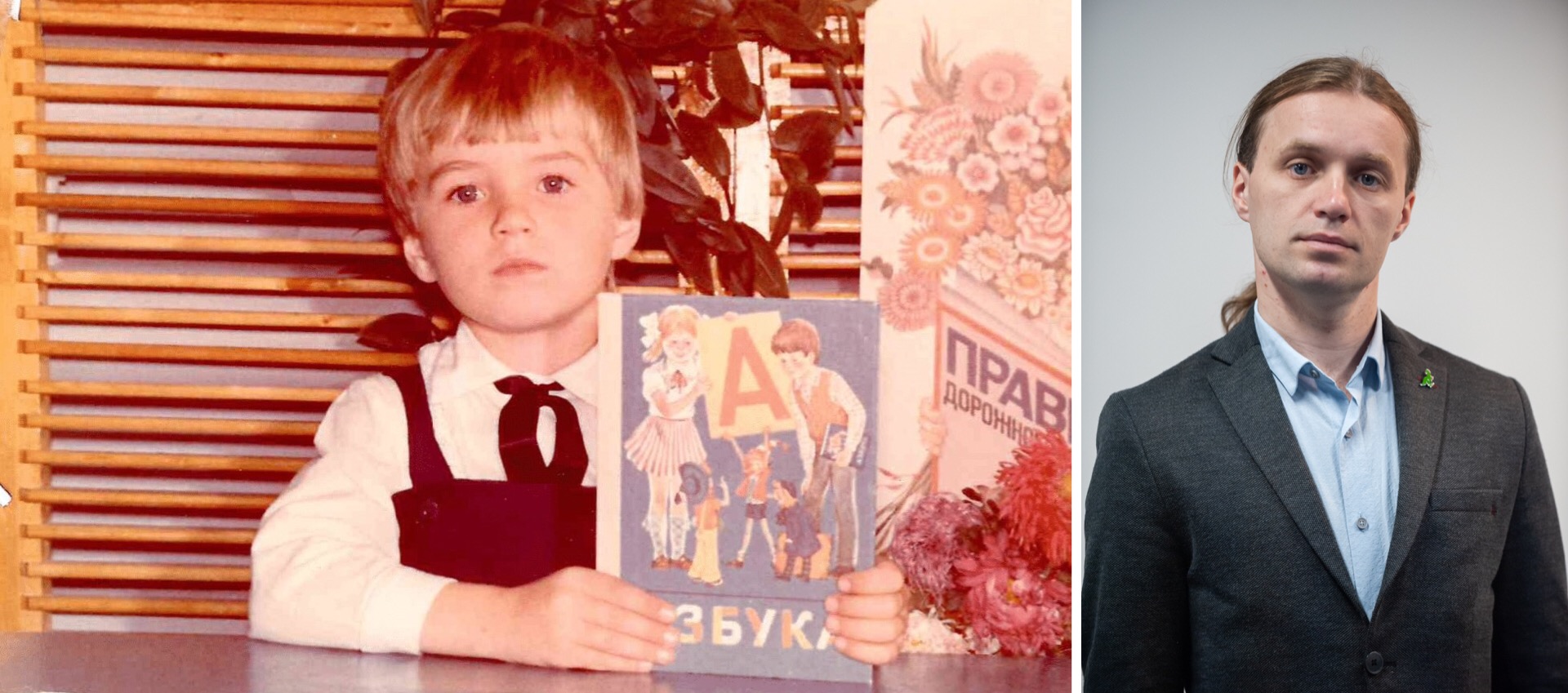
Left Sergey Pimkov - first grader, right - Deputy General Director for Development and Operation
Nikolay Tolly, Head of BI Department Uchi.ru: A strong teacher is always a good help in studying the subject. I had no particular desire to study Russian language and literature, but it was in these subjects that I had the strongest teacher, thanks to which I know them quite well. It was interesting for me to study specialized mathematics and computer science, and the role of a teacher was less important.
Artem Mezin, technical product manager of Behavox : I think I would not have had a single chance to get an education and make a career if it were not for my teachers in my life. In my school there was a clear understanding that first of all you need to teach how to learn, and then the students will master everything themselves.
Oleg Duletsky: I was lucky with teachers, classmates and, ultimately, with the country. It was difficult to study, but interesting. And due to the fact that I was a complete nerd, physically frail, fate was written to me to study well and let my classmates cheat.
Tell us about the teacher you remember
Evgeny Pomytkin, Head of Mobile Development Department Uchi.ru : History teacher. She burned with her subject, showed that history is not only dry facts, it is people and peoples, in the development of which there are laws.
Alexey Vakhov, technical director of Uchi.ru: Sergey Evgenievich Polyansky is my teacher of Olympiad physics. A bright, charismatic uncle. I first met him on a physics test at a new school. In the classroom, no one solved a single problem, and I solved half of one - these were Olympiad problems from a Polish textbook. After that, Sergei Evgenievich and I began to prepare for the Olympiad, took gold at the international competition in physics. He didn't train me, but he gave me a bunch of literature, there was no compulsion in this. During his trips to the Russian Olympiads, he was attentive, knew how to organize the life of children, could calm down, when it was necessary - to push.
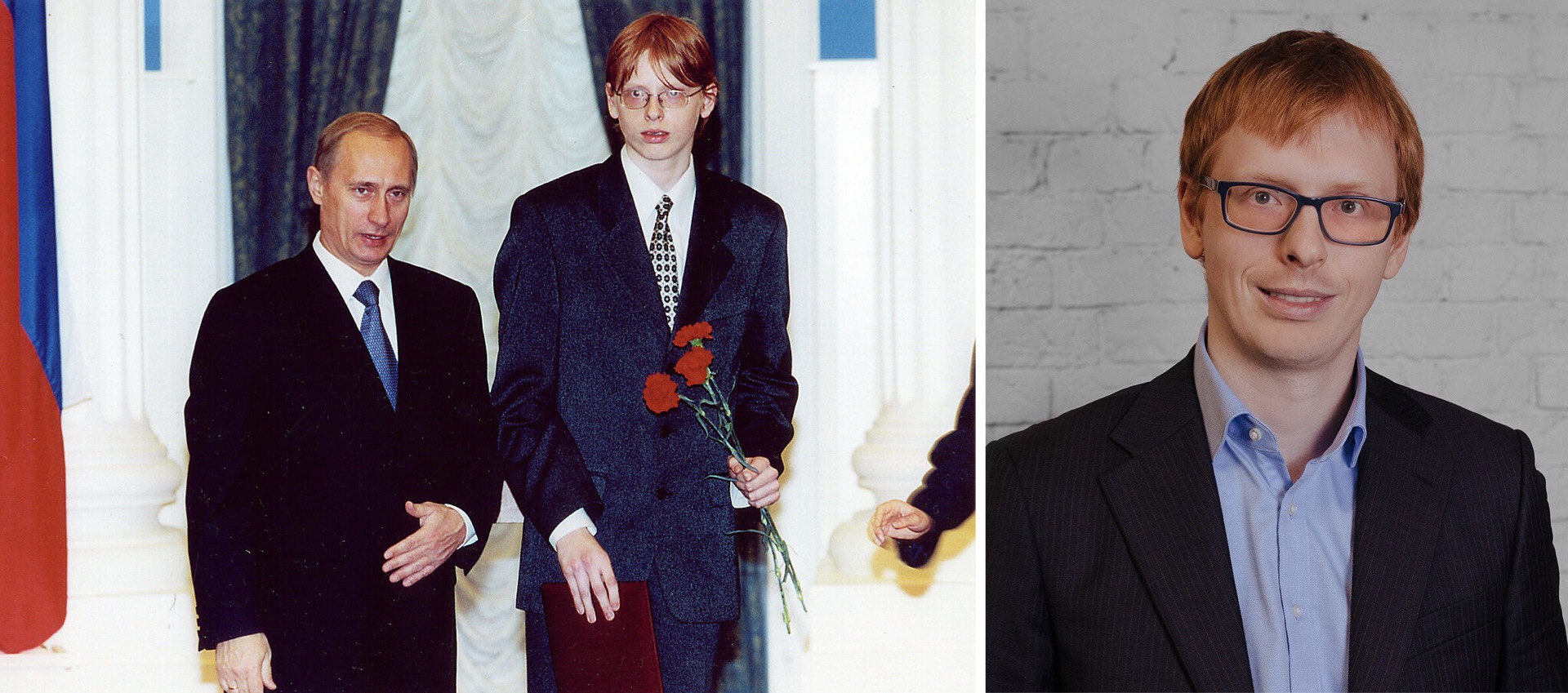
Left Alexey Vakhov - 11th grade graduate and winner of the International Olympiad, right - Technical Director
Alexey Petrov, Quality Director of SberMarket: Probably, the brightest and warmest impressions I got from our class teacher in high school - Raisa Grigorievna Mirimskaya. An amazing and wonderful teacher, she taught mathematics and geometry, encouraged freedom of thought, while promoting their rigor and precision, as befits mathematics. Yes, she was a very extravagant woman, for example, she could unexpectedly come to school with purple hair, and she had a dozen cats at home. But with such passion and ecstasy, only she could talk about isosceles triangles, polynomials, Newton's binomial and Cheva's theorem.
Alexander Tsvetkov, Head of the Mail.ru Mail frontend project: It is very difficult to single out a specific teacher, I would like to talk about many people. But, probably, the warmest and best memories were of my first class teacher. I was quite an active child, my studies were easy for me, but due to the constant haste, I was often inattentive. It was the class teacher who did not let me get bored, came up with new tasks and directed my energy in the right direction. When I was in a hurry and made a mistake, I did not stop right away, but waited until I finished, and showed on the final result what the rush leads to.
Did the teachers assume who you would become? And you yourself?
Andrey Tereshko : I remember well how the mathematics teacher said: "If you don't know mathematics, you won't become a programmer." And after that I completely lost my mind on mathematics. Which, of course, greatly hindered and still hinders in some moments. In many ways, I had to figure it out from scratch, which is much more difficult than at school.
Ivan Chernov : Nobody spoke for sure about management or management. And I myself wanted to be a theoretical physicist, and quite as a child - a traffic cop, but my dreams did not come true.
Andrey Petrov, Ruby on Rails team lead Uchi.ru : Both the teachers and I were sure from the 10th grade that I would go to study as a programmer. I didn't even consider other faculties. It was surprising to me that many have no idea what interests them and what specialty they would like to enter.
Sergei Pimkov : It's hard to say, but considering that I spent quite a lot of time in the computer science classroom (closer to Turbo Pascal, and, well, Doom, of course), I suppose my work in IT could seem like a likely option to teachers.
Alexey Petrov : The teachers hoped that we would "get something good."
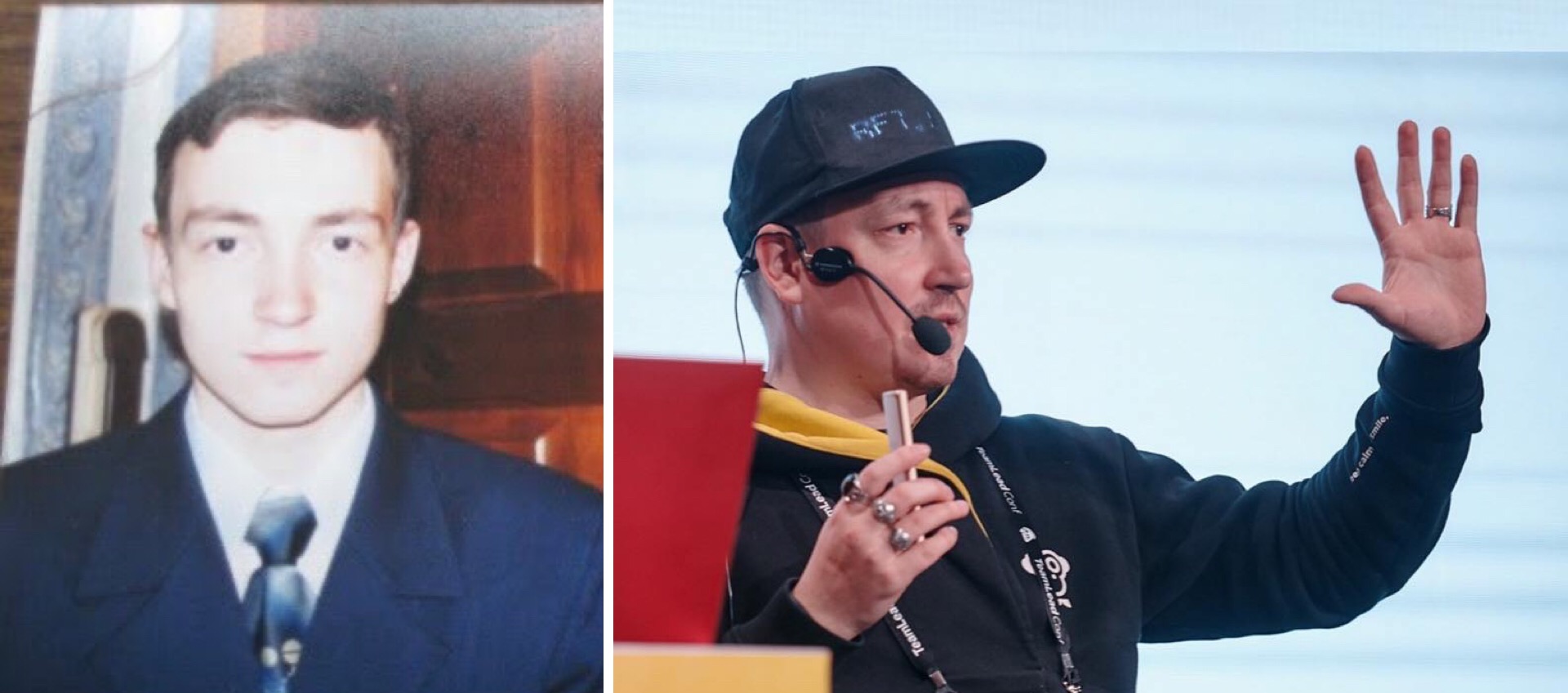
Left Alexey Petrov - a schoolboy on the last school day, right - Quality Director
Did your school have a computer lab? Which Pentium?
Alexey Petrov : We had Pentium 133 and one or two i386.
Andrey Tereshko : I started programming at the age of ten, the first computer was the Soviet analogue of the ZX Spectrum - Raton-9003. He connected to the TV, and the programs were loaded from tape cassettes. I joke that I started coding because it was faster than loading the game. And this is only partly a joke.
Sergey Pimkov : It all started with programming in "Kengurenka", which drew lines on the screen. Then there was Turbo Pascal: I bought Faronov's book and for some time was enthusiastically engaged in drawing beautiful shapes. Then a computer scientist gave me an epic binder of ancient Turbo Vision documentation, printed on tissue paper (or something), apparently from some kind of computing center, and I dived into OOP.
In our class, I think we had one or two first Pentiums, several 486s and 386s. My first computer appeared in the 10th grade, it was Celeron 233 Mhz.
Evgeny Pomytkin : Computers were few then. Pentium? Hehe. We had one computer per class, something Soviet. I'm old.
Andrey Rynkevich : There was a computer class at school, but we were engaged in it with very basic skills in using a PC. It was possible to get in touch with programming only at the institute. I still remember how in the first lesson the teacher issued an assignment and everyone rushed to carry it out. I didn't even know how to control the cursor in MC.
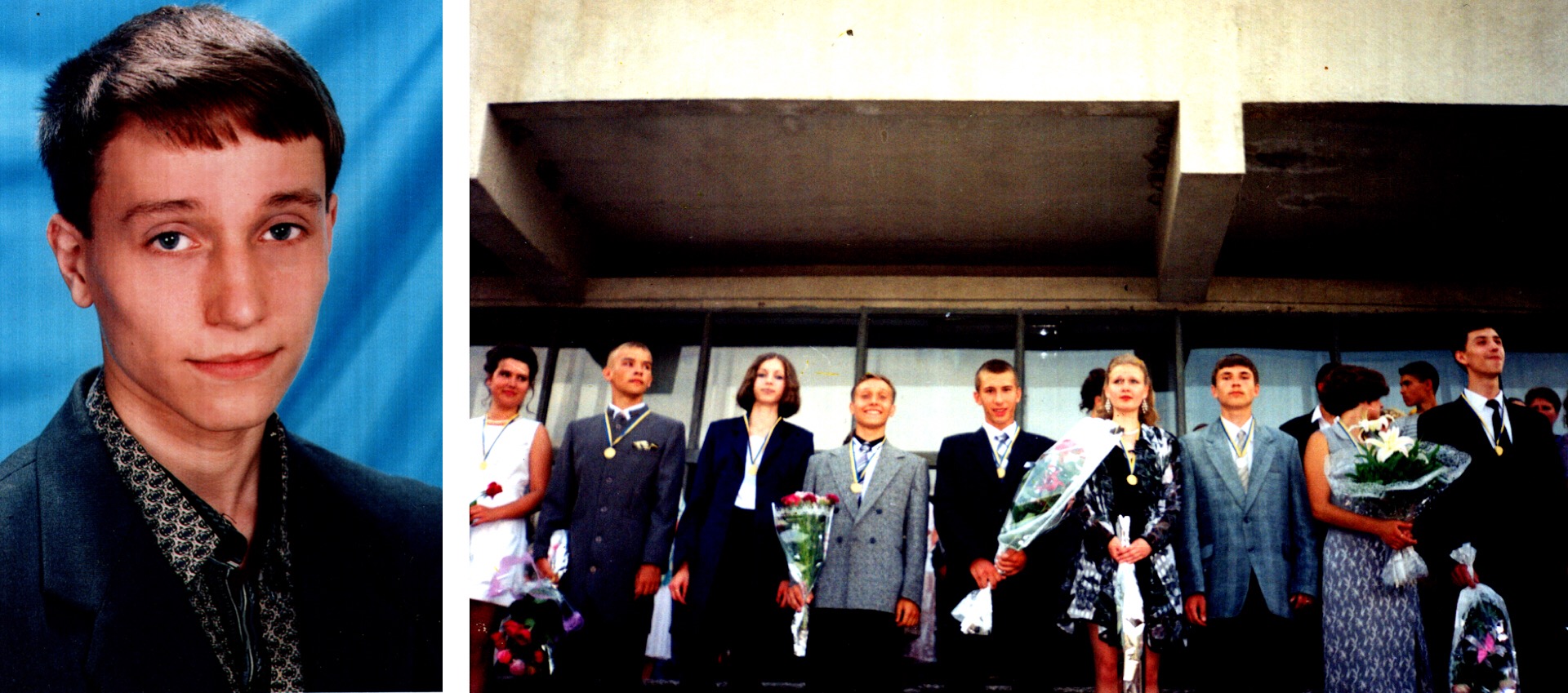
School photos of Andrey Rynkevich
Andrey Petrov : I had my first dual-core AMD in the 8th grade.
Ivan Chernov: My father worked as a programmer when I was away. Therefore, we had a computer at home even before I was born, and closer to zero they gave me my own, with an LCD display and a Pentium 4. The school was also equipped with a computer class, we learned programming with the Logo turtle. At some point, the school was presented with a switch, and Doom 2 tournaments began to gather during breaks.
Alexey Vakhov : Our school was strong, there were many computer classes. It was 97. The Pentium was probably MMX 133.
Oleg Duletskiy : There was no class at school, no Pentiums - there were 20 years before they appeared. Back then, programmable calculators were just emerging. Like MK-61. Such a father brought home from work, I remember him.
Artem MezinA: At school, I was a fan of everything related to computers. The film "Hackers" and the novel "Neuromancer" are just the bible of school years! My first computer was a personal computer with an Intel 80286 processor (this is not a Pentium yet, but it is close). At a more or less conscious age, there were different machines from P1 MMX 166Mhz (and then the whole PC was characterized as a processor for simplicity) to AMD Athlon 800.
Nikolai Tolly : There was a computer class at school, it seems, there were Pentium 4.

On the left Nikolai Tolly - at the graduation , on the right - head of BI department
Alexander Tsvetkov: The school had a brand new computer class, equipped according to some state program. I remember how I came across the official website of Ubuntu OS on the Internet and there was a banner on it informing that you can order a disc with this operating system for free, which I immediately did, not really believing in the result. Imagine my surprise when a month later there was a disk in the mailbox! Present! On that day, astrologers announced a month of sleepless nights and red eyes.
How would you do computer science if you were at the blackboard? And if you find yourself in exactly one lesson, what will you tell the students?
Oleg Duletskiy : Programming is not a subject for the board. And, of course, you can't tell anything about development in one lesson. But about its meaning - you can.
Sergei Pimkov : If I taught informatics, I would try to structure the classes so that they eventually lead to the achievement of one big ultimate goal. Today we are writing bubble sorting, tomorrow we are sorting some useful data that we had previously shoved into the database using a simple form. And in the end - a large working application, and not a set of unrelated labs. And each of the components can be rewritten, replaced, and improved.
Artem Mezin: I have some teaching experience. The most important thing is to just talk to students as equals. To really want to understand what is interesting to them, and to do it. It will be interesting to cut TikTok - we will cut it, it will be interesting to break the school Wi-Fi - we will break it!
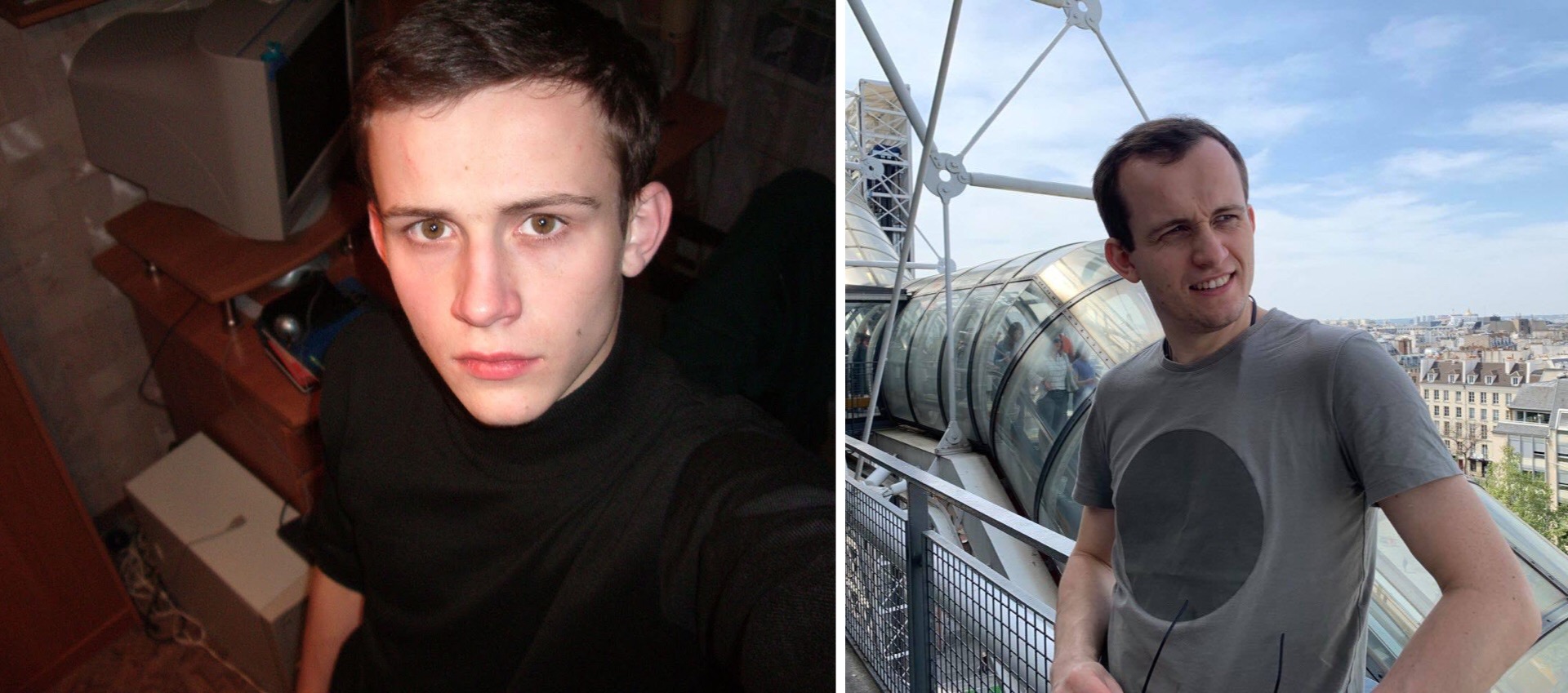
Artem Mezin on the left - a high school student, on the right - technical product manager
Alexey Petrov: I am sure that the more students have access to the embodiment of their ideas, the more interesting the lesson will be and the more involved the students will be in the lesson. For example, I teach my eldest son the basics of Scratch programming, with my daughter a Lego robot. We do not just learn loops, variables, conditional operators and functions, but immediately fix this information in a real project: we teach the game character to throw the ball at the touch of a button or the robot to follow the required route.
Evgeny Pomytkin: Landau once said: "Physics of our day does not need to know physics, it is enough for him to know mathematics." Something similar can be said about programming. There are two important dimensions here: logic and a genuine interest in exploring and changing the world. With both tools, you can easily learn programming. This is what I would show to schoolchildren.
Alexey Vakhov : In the first lesson, I would study what kind of audience is in front of me, what they want, how to hook them. At first I would have found a common language with them. I believe that any activity is interesting - you just need to find a response from people. It's not enough to be lured into programming with a promise to teach you how to make games, for example. It is necessary to show some beauty in the object itself. I would divide the audience: who should not be touched and given some basic things, and who can be carried away by this beauty.
They said about the school:
- , .;
- , Selectel;
- , .;
- , «»;
- , BI .;
- , Ostrovok.ru;
- , .;
- , « Mail.ru»;
- , Ruby on Rails .;
- , product owner Big Data;
- , backend- Ruby on Rails .;
- , Behavox.